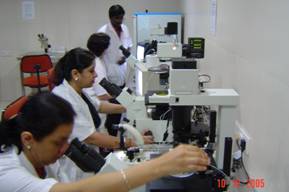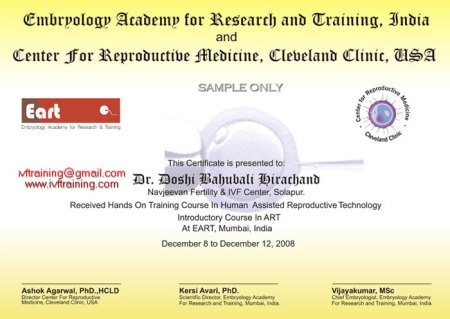Future Of IVF in Assisted Reproductive Technology – Future of Fertility Treatment – IVF future – Economical, High Success Rate, Safer IVF Treatment – The ambitious future of IVF Treatment – The importance of IVF Laboratory and IVF process – Future of IVF and Genetic Testing – Bright future of IVF and ART related techniques – 21st Century Future of In Vitro Fertilization
In vitro fertilization (IVF) is the most common and most effective type of assisted reproductive technology (ART) to help infertile women become pregnant. In an IVF process, eggs are removed from the ovaries and fertilised with sperm in the laboratory. The fertilised egg (embryo) is later placed in the woman’s womb.
Since it was first used in 1978, in vitro fertilization (IVF) has created more than 5 million babies. Success rates for IVF depend on a number of factors, including the reason for infertility, where you’re having the procedure done, and your age. Currently pregnancy is achieved in an average of 29.4% of all IVF cycles (higher or lower depending on the age of the woman. The percentage of cycles that resulted in live births was 22.4% on average (higher or lower depending on the age of the woman). apart from the success of the IVF treatment infertile couples know that IVF is expensive, and doesn’t always mean the birth of a baby. Hence the number of infertile couples opting for this treatment is less.
The future of IVF treatments is very good. With advances in the technology of ART, IVF treatment is going to be the first solution for intended parents. Following are the points where IVF has more good options of improving and it has already seen boost in the treatments.
1) Chromosomal Abnormalities
Many of the embryos formed during infertility treatments carry no possibility of becoming a baby because they carry lethal genetic abnormalities. Around 70% of the time, an embryo fails to form because of these abnormalities in its DNA. The pregnancy does not take place and patient has to go for another ivf cycle. There are ways, however, of improving the odds.
PreImplantation Genetic Diagnosis: Today Preimplantation genetic diagnosis (PGD) helps you distinguish which embryos have genetic or chromosomal defects before implantation. If you or your family is a carrier of genetic diseases, you can have embryos examined through PGD, and screened for genetic diseases, including Fragile X Syndrome, cystic fibrosis, Huntington’s disease, and many others.
This procedure allows you to select the healthiest embryo for implantation, increasing your chances of having a healthy baby. If your family has a history of hemophilia, for example, preimplantation genetic diagnosis reveals which embryos test positive for the disease.
The Future of IVF and Genetic Testing
A recent scientific breakthrough in preimplantation genetic diagnosis gives many couples new hope. Next generation sequencing is a game changer for couples who turn to IVF. This new technology sorts through genetic information and mutations, improving doctors’ ability to detect abnormalities and identify embryos with the highest chances of producing a viable pregnancy.
This procedure allows you to select the healthiest embryo for implantation, increasing your chances of having a healthy baby. If your family has a history of hemophilia, for example, preimplantation genetic diagnosis reveals which embryos test positive for the disease.
2) Transfer of Embryos
Initially more than two embryos were implanted to get favourable results. With the help of blastosyst embryo transfer only healthy and viable embryos are transferred which results in pregnancy. Cryopreservation of unused embryos is efficient, since embryos without the capacity for full development are not frozen. Blastocyst transfer also allows the option of single embryo transfer. The advances in genetic screening will go far beyond getting people pregnant, however, as we better define genetic diseases and learn how to screen for a greater number of serious conditions. This is complex, both medically and ethically, but the future convergence of well-defined genomes and very effective embryo testing makes this application inevitable at some point of time.
3) Ovarian Tissue Transplant
Ovarian tissue transplant has the potential to revolutionise fertility treatment. Ovarian Tissue Transplant followed by Successful IVF Creates Future Fertility Hope for Ovarian Cancer Survivors. A women who is facing infertility problem because of ovarian cancer treatment, now has the ray of hope to achieve pregnancy. The sample of ovarian tissue is taken from the patient’s cancer-free ovary through keyhole surgery and is then frozen. After the patient is ready and free from her treatment, the tissue which is frozen is grafted onto the left and right sides of the front wall of her abdomen. After a few months the tissue starts working, and with a gentle dose of hormone treatment produced follicles and two single eggs. Both were fertilized, implanted, and became viable pregnancies. These is possible because of the freezing process of ovarian tissue in the IVF laboratory. This technique is new and will be a great boon for infertile couples facing fertility issues because of cancer diagnosis.
4) Three Parents: The Twenty-First Century Future of In Vitro Fertilization (IVF)?
Babies with three parents could soon be born through controversial new IVF treatment. The new in-vitro fertilization technique, currently in the research phase, is nearing approval in Britain and would be the first to involve genetically modified embryos. The technique is meant to enable parents to avoid passing on diseases to their offspring. To prevent the passage of mitochondrial disorders from mother to child, researchers have devised a solution. The fertility treatment, known as mitochondrial transfer, tries to replace a faulty part of a mother‘s egg with healthy material from a donor, creating a “genetically modified child” with three biological parents. The technique has proven successful in human cells in the ivf laboratory and is awaiting recognition.
It involves intervening in the fertilization process to remove faulty mitochondrial DNA, which can cause inherited conditions such as fatal heart problems, liver failure, brain disorders, blindness and muscular dystrophy. The methods are designed to help families with mitochondrial diseases – incurable conditions passed down the maternal line that affect around one in 6,500 children worldwide.
5) Better, Faster, More Budget-Friendly IVF Treatment
NGS technology (Next generation sequencing) has its advantages over older technology such as microarray. Next generation sequencing not only hikes the chances of getting a healthy pregnancy, but does so at a lower cost, and with more details and accurate information. What makes this cutting-edge process even more appealing, besides the very real promise of taking the guesswork out of making a baby, are the super-quick results it delivers. In only 24 hours, doctors will be able to have a complete assessment of the embryo’s health.
6) What will it take to bring down the costs of IVF?
The biggest step will be automating the IVF lab. The embryologist opens the incubator door, takes out the petri dish, does something to the embryo or the media, opens the incubator door, put the dish back, close the incubator door series of steps for every IVF case that has been used since the 1980’s. The technology-robotics, microfluidics, incubators with cameras etc, already exists. Probably new invention will keep on taking place. These will involve higher success rate in ivf treatment, low cost ivf treatment and increased amount of infertile couples opting for IVF and ART related techniques.
In all IVF treatments eggs, sperm and embryo creation is very essential. Whether it is donor egg, donor sperm or infertile couples own eggs and sperm. Handling of all these requires very hygienic conditions and prescribed temperatures and sterlisation. They are to be stored in freezer. Handling of all these requires expert training and knowledge be it either embryologist or gynaecologist.
Assisted Reproductive Technologies, be they Intrauterine Insemination, In Vitro Fertilization or Intra cytoplasm sperm injection – all need skill and precision which could be acquired from in depth knowledge and experience. Embryology Academy for Research & Training with their judicious mixture of various teaching modules, lectures, actual hands-on-training and demonstrations ensure quality training much to the satisfaction to the young aspirants and embryologists.
Knowledge from the basics in embryology to the ultimate in cryosciences and laser devices all is imparted by their dedicated team to ensure continuity of care. EART at every step strives ahead to perfection. Coupled with critical care management and laboratory skills EART also provides a comprehensive exposure to the whole setup of assisted human reproduction.
The last few years have witnessed rapid innovative strides in the field of embryology the world over. Discoveries, innovations, techniques and gadgets have their never ending list in their march towards obtaining perfection in embryology. There has been a boom in ART laboratories with the sole aim of living upto the challenge posed by infertility. In bringing such plans to fruition there still remains one challenge which is perennially faced by labs in India and abroad – a dearth of embryologists.
At EART our aim is to offer the most advanced and globally competitive training in the field of ART. Our IVF Training centre besides being optically equipped with the state-of-art equipments, mentors the trainees by renowned embryologists, andrologists, biologists, reproductive endocrinologists and other experts in assisted reproductive techniques. A constant desire for up gradation coupled with a motivated team spirit is EART’s goal to success.
Read more about:::
Equipments and supplies used in an IVF laboratory
IVF TRAINING (EMBRYOLOGIST & GYNAECOLOGIST)
Intensive Hands on IVF Training for Gynaecologist & Embryologist
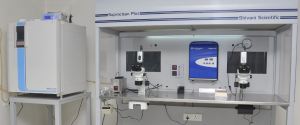
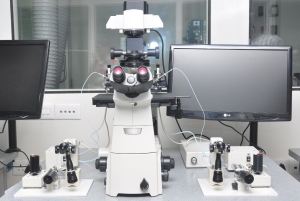
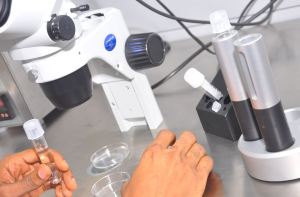
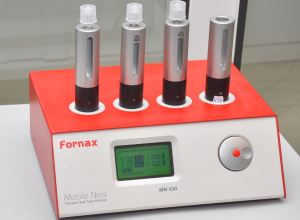



 Posted by IVF Training
Posted by IVF Training 